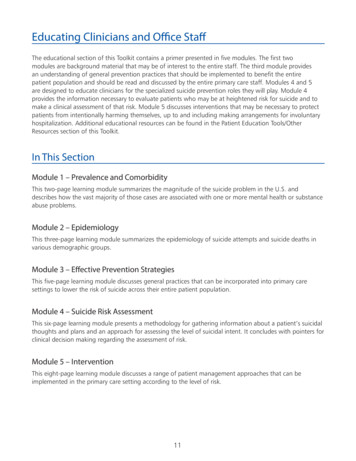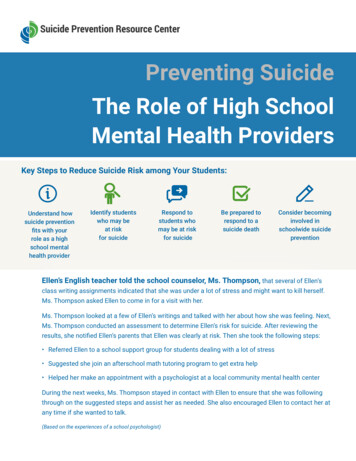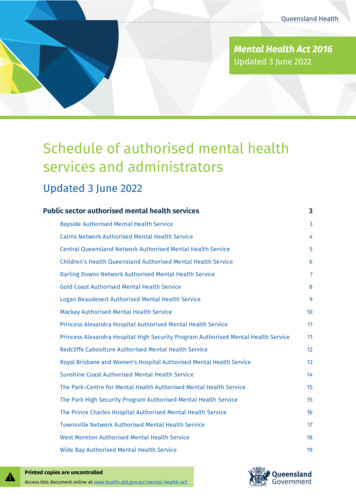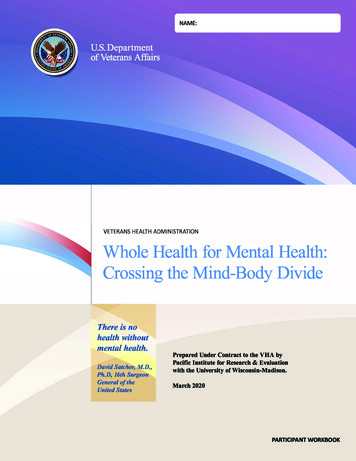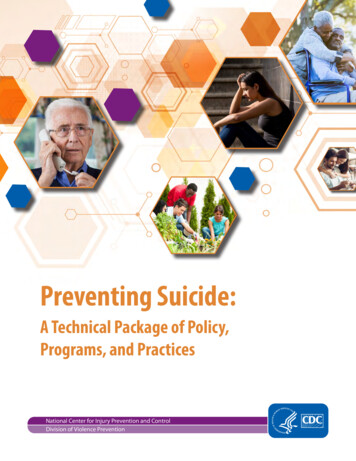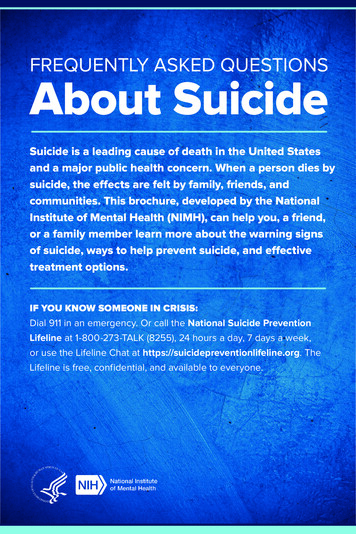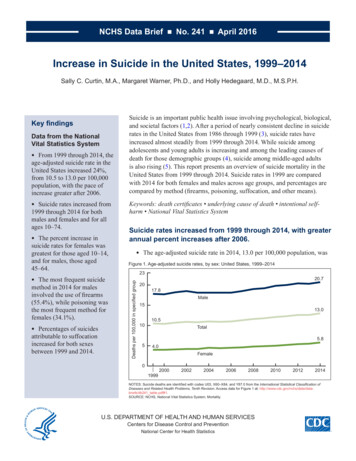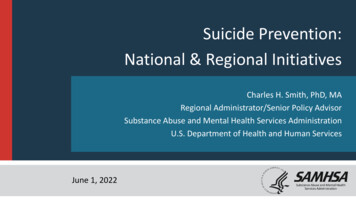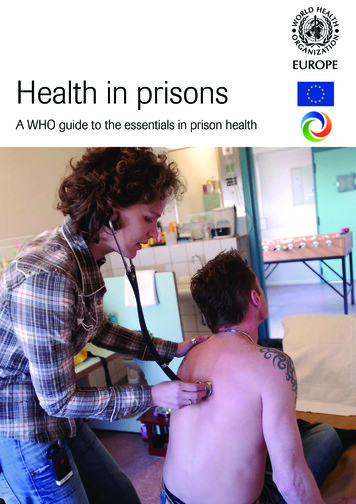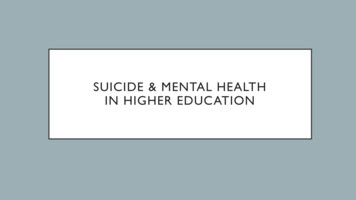
Transcription
SUICIDE & MENTAL HEALTHIN HIGHER EDUCATION
TRICIA HENDERSON, LPC-MHSPPrevention: Mental Health Substance Use Suicide Sexual Misconduct and Relationship PreventionDepartments: Counseling Center Dean of Students Office Health/NursingCommunity Involvement: TSPN Southeast Regional Chair TSPN Higher Education Taskforce Member TSPN Advisory Board Member Coalition for Healthy and Safe Campus Communities, ChairUTC
TENNESSEE SUICIDE PREVENTIONNETWORK Grass-roots association Implements the Tennessee Strategy for Suicide Prevention as defined by the 2001 NationalStrategy for Suicide Prevention Provides programs, trainings, crisis intervention, postvention support, and preventionstrategies for our state Regional Directors- find one in your area! Advocate for policy and legal changes
FACTS ABOUT SUICIDE 47,173 people died by suicide in 2017 in the United States 1163 people died by suicide in 2017 in Tennessee Over 1.2 million people attempt suicide each year, according to a recentSAMHSA study (2017) Suicide was the 9th leading cause of death for all age groups (2017) in TN Suicide is the leading cause of death of ages 10-17 in Tennessee Suicide is the 2nd leading cause of death of ages 10-24 Tennessee.CDC/SAMHSA/AAS/TDOH
IMPACT
Challenge stigmaIdentify individuals at riskEncourage early interventionIncrease communicationRestrict meansDevelop crisis management planArrange follow-up
TSPN HIGHER EDUCATION TASK FORCE Mission/goal:This task force, an appointed task force created and approved by the TSPN Advisory Council on June 8,2017, will hereto serve to unite colleges/universities throughout Tennessee towards the goal of suicideprevention. The task force will meet to create and carry out action items to best help the at-risk populationof college students. Colleges and universities pose a unique problem for suicideprevention/intervention/postvention efforts. By employing the expertise of those listed to below, to beinvited to this initial task force, it is the hope that this effort will expand to other colleges and universitiesthroughout the state, creating suicide safer campuses throughout Tennessee. Primary education & Jason Flatt Act
TSPN HIGHER EDUC ATION TASK FORCEC H A I R : S A N D R A P E R L E Y, E D. D , M S N , R N , C O L U M B I A S TAT E C O M M U N I T Y C O L L E G E , Argosy University: Byron Pickens, Ph.D., Professor Austin Peay State University: Leslie Reed, PhD,MSN, RN, Associate Professor of Nursing Baptist College of Health: Caryn Schmitz, MA,NCC, LPC-MHSP, Professional College Counselor Belmont University: Katy Wilson, APRN, MSN,MBA, Assistant Dean of Students Carson-Newman University: Jennifer Catlett,LCSW, Director of Counseling Services Lindsey Wilson: Janet Turner, PhD, LPC-MHSP, NCC,ACS, Associate Professor Lipscomb University: Andrea Mills, Med, LPCMHSP, Assistant Director of University CounselingCenter Middle Tennessee State University: Mary KayeG. Anderson, Psy.D.-HSP, Director of Counseling andTesting Services Motlow State Community College: CherylHyland, Ed.D.,Vice President of Student Affairs Northeast State Community College: DeniseWalker, MS, LPC, Director of Counseling Services Pellissippi State Community College: TravisLoveday, MA, Dean of Students TN Tech University: Christina Mick, EdD, AssistantDirector of Counseling Services University of Memphis: Susan Elswick, EdD, BAProgram Director Department of Social Work UT Chattanooga: Tricia Henderson, LPC-MHSP,Assistant Director Alcohol, Other Drug, & MentalHealth Education UT Knoxville: Kelly Rubin, LPC, MAC, AssociateDean of Students UT Martin: John’Na Webster, MSW, Health andWellness Educator Tennessee Higher Education Commission: LouHanemann, Assistant Executive Director for ExternalInitiatives Tennessee Board of Regents: Kristina Waymire,Director of Student Initiatives
TSPN HIGHER EDUCATION TASK FORCE Advocacy and Sustainability Committee Protocol Committee Outreach Committee
TSPN RESOURCES The Status of Suicide 2019 Tennessee Higher Education Suicide Prevention White Paper Tennessee Higher Education Suicide Prevention Strategies for Outreach and CurriculumInfusion Tennessee Higher Education Suicide Prevention Protocol Guidelines for Suicide Preventionand Postvention Trainings for little to no cost Programming support Regional meetings Professional Development
STATE OF TENNESSEE LAWP U B L I C C H A P T E R N O. 4 5 5 A M E N D S T I T L E 4 9 , C H A P T E R 7 O F T E N N E S S E EC O D E A N N OTAT E D TO A D D N E W S E C T I O N (a) Each state institution of higher education shall develop and implement asuicide prevention plan for students, faculty, and staff. The plan must bedeveloped in consultation with campus mental health professionals and suicideprevention experts. The plan must identify procedures related to suicideprevention, intervention, and postvention.
STATE OF TENNESSEE LAWP U B L I C C H A P T E R N O. 4 5 5 A M E N D S T I T L E 4 9 , C H A P T E R 7 O F T E N N E S S E EC O D E A N N OTAT E D TO A D D N E W S E C T I O N (b) Each state institution of higher education may seek assistance in developinga suicide prevention plan from an organization that engages in a variety ofinitiatives to improve crisis services and advance suicide prevention, such asthe Tennessee Suicide Prevention Network or a successor organization, andmay seek information from such an organization for information on thedevelopment of training programs pursuant to 63-1'125(c)(1). 63-1'125(c)(1). (c) The department of mental health and substance abuseservices shall: (1) Develop, in collaboration with the Tennessee SuicidePrevention Network, a model list of training programs
STATE OF TENNESSEE LAWP U B L I C C H A P T E R N O. 4 5 5 A M E N D S T I T L E 4 9 , C H A P T E R 7 O F T E N N E S S E EC O D E A N N OTAT E D TO A D D N E W S E C T I O N (c) Each state institution of higher education shall provide the suicide preventionplan to students, faculty, and staff at least one (1) time each semester. SECTION 2. This act shall take effect July 1 ,2019, the public welfare requiring it.
PREVENTION How are you training your faculty and staff? What are expectations (QPR, Columbia Scale)? How can you use your intervention team? Have you conducted an environmental review? How many clicks from homepage does it take for someone to access resources? Access to screenings. Pre-matriculation education, screenings, and connection resources. Information to caregivers. Community partnerships. Resource folders. Promotion of national hotlines. Surveys- Healthy Minds. Tiered trainings- You can help a friend/student, QPR, YMHFA, ASIST.
TSPN Provides strategies by campus demographic Resources Social media guidance Faculty curriculum infusion ideas Faculty syllabus statements Freshmen orientation presentation slides Example MOU
INTERVENTION Crisis response protocol. Off- vs on-campus students. MOU with local hospitals. Hospital transport. Follow-up care. Diversity of resources and access points. Roles and responsibility of staff and faculty. Reporting and response to students of concern. Reporting and response to faculty and staff.
POSTVENTION Student death policy? Assign a lead for postvention protocol and coordination of services. Plan communication ahead of time. Timing of messaging and content can impact suicide cluster and contagion. Connecting faculty, staff, and students to resources. Support and care for responders. Debrief and review response.
TSPN Identifying suicidal students Responding to acutely distressed students Warning signs Example MOU Sample reporting form Postvention recommendations Media toolkit
RECOMMENDATIONS JED Campus Healthy Minds Study TN Disaster Mental Health Strike Team Attend TSPN regional meetings Expand prevention Promote social connectedness and healthy life skills Conduct an environmental review
JED CampusJED Campus promotes a comprehensive public healthapproach to emotional well-being.Health Minds StudyAssessment & Information GatheringFeedback ReportCampus VisitStrategic Plan
Program Director Department of Social Work UT Chattanooga: Tricia Henderson, LPC-MHSP, Assistant Director Alcohol, Other Drug, & Mental Health Education UT Knoxville: Kelly Rubin, LPC, MAC, Associate Dean of Students UT Martin: John'NaWebster, MSW, Health and Wellness Educator Tennessee Higher Education Commission: Lou
